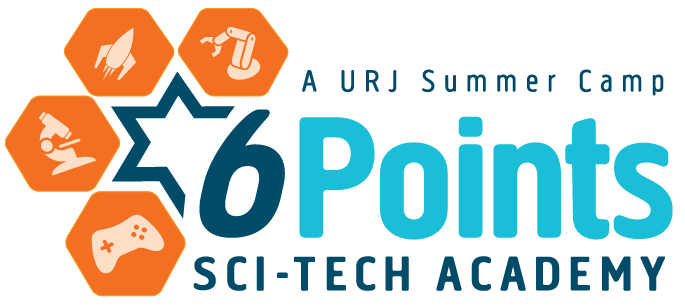By Jonah Lerner, Robotics Instructor
This summer, as the robotics workshop instructor, I was tasked with developing a curriculum that seamlessly integrates robotics and Judaism. At first, I thought this was an extremely difficult task because robotics and Judaism appear to be two very different practices. After a few discussions with other staff members, however, we found many clear connections between the two. Some of these connections include gears and how they relate to our communities, accepting each other’s differences, and creating something unique.
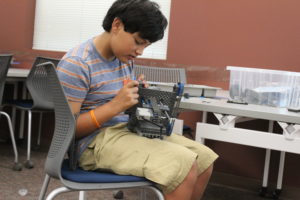 Gears work together in gear systems to do what we need (or design) them to do. A gear system may contain multiple gears, shafts, support pieces, and a driving force. If, hypothetically, one of the parts fails, then the gear system won’t function at its’ best, if at all. This idea holds true when it comes to communities as well. Every community has different components that all work in tandem to create the best possible community for everyone. However, similar to the gears, if something shuts down or changes, the community will function differently and even potentially below expectation. The way that we discuss and view gear systems relates directly to the idea of a kehillah kedoshah. A community in which all people are valued and important is similar to a gear system in which every part is necessary in order to function as it does.
Gears work together in gear systems to do what we need (or design) them to do. A gear system may contain multiple gears, shafts, support pieces, and a driving force. If, hypothetically, one of the parts fails, then the gear system won’t function at its’ best, if at all. This idea holds true when it comes to communities as well. Every community has different components that all work in tandem to create the best possible community for everyone. However, similar to the gears, if something shuts down or changes, the community will function differently and even potentially below expectation. The way that we discuss and view gear systems relates directly to the idea of a kehillah kedoshah. A community in which all people are valued and important is similar to a gear system in which every part is necessary in order to function as it does.
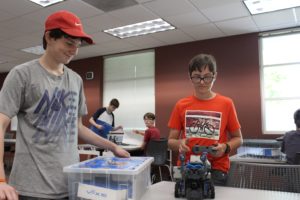 Part of the robotics program involves all of the campers receiving the same kit of parts (Vex IQ kits) to make their robots. Each group of campers will then create a unique robot from these parts. Similar to the idea of B’tzelem Elohim and us all being made in the image of God, everything is created from the same basic parts (robots from blocks and gears, humans from cells and tissues). What we all choose to do with those parts is what makes each person a unique. Having each group create their own robot from scratch will allow for each robot to be unique and add something different to the workshop and overall experience.
Part of the robotics program involves all of the campers receiving the same kit of parts (Vex IQ kits) to make their robots. Each group of campers will then create a unique robot from these parts. Similar to the idea of B’tzelem Elohim and us all being made in the image of God, everything is created from the same basic parts (robots from blocks and gears, humans from cells and tissues). What we all choose to do with those parts is what makes each person a unique. Having each group create their own robot from scratch will allow for each robot to be unique and add something different to the workshop and overall experience.
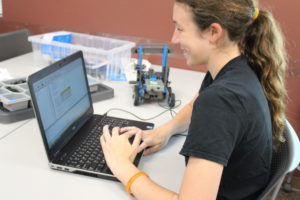 The finale for robotics is creating a robot that either plays Matzah Ball Mania or Chametz Hustle. Matzah Ball Mania is a game in which campers will be trying to prepare for a Passover seder. There are eight people and the goal is to feed as many people within the given timeframe as possible. Campers will also be discussing how Judaism is made up of different people with different traditions and rituals and how it is important to accept each other’s differences and learn from each other. In Chametz Hustle, the campers will be putting food cubes into different storage containers based off the color as well as searching for the afikomen (a heavier food cube). The campers will then discuss keeping traditions during Passover primarily regarding chametz.
The finale for robotics is creating a robot that either plays Matzah Ball Mania or Chametz Hustle. Matzah Ball Mania is a game in which campers will be trying to prepare for a Passover seder. There are eight people and the goal is to feed as many people within the given timeframe as possible. Campers will also be discussing how Judaism is made up of different people with different traditions and rituals and how it is important to accept each other’s differences and learn from each other. In Chametz Hustle, the campers will be putting food cubes into different storage containers based off the color as well as searching for the afikomen (a heavier food cube). The campers will then discuss keeping traditions during Passover primarily regarding chametz.
Through the lens of robotics, our campers learn about and
dive deeper into our Jewish traditions, and our core values at camp, which includes b’tzelem Elohim (radical acceptance). This is the beauty of specialty camp – campers who are engaged by science and technology, or the specialty, also get to interweave Jewish learning and tradition. I’m so excited to see what crazy and intricate robots our campers will create this summer!
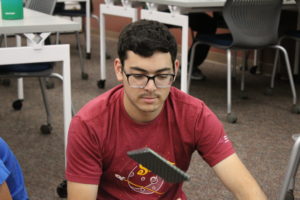 Jonah is a senior robotics engineering student at Arizona State University, originally from Phoenix, AZ. He grew up at Camp Stein, has 7 years of robotics experience and has coached multiple FIRST teams to the Arizona State Championships. He loves ultimate frisbee, running, coding, and building robots.
Jonah is a senior robotics engineering student at Arizona State University, originally from Phoenix, AZ. He grew up at Camp Stein, has 7 years of robotics experience and has coached multiple FIRST teams to the Arizona State Championships. He loves ultimate frisbee, running, coding, and building robots.
